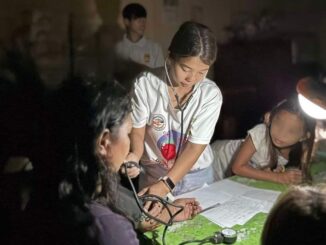
While some mpox cases have also tested positive for the human immunodeficiency virus (HIV), infectious disease expert Dr. Rontgene Solante clarified Sunday that there is no actual connection between the two viruses.
Solante, however, pointed out that those who engage in such sexual behaviors are at “high risk” of getting mpox, as the virus can be transferred via close and intimate, skin-to-skin contact.
“Walang connection ito (mpox) doon (HIV). Iba naman ang HIV… It’s a different type of virus, which is a really progressive type of infection na talagang unting unti sisirain niya ‘yung immune system natin,” the doctor said.
(Mpox has no connection with HIV. HIV is a different type of virus, which is a really progressive type of infection that will slowly destroy our immune system.)
“Talagang (sexually active individuals) lang ang high risk because of the behaviors siguro. Kasi sa mga ganitong klaseng ano na intimate ang exposure, so sila ‘yung nahawaan,” he added.
([Sexually active individuals] are just at high risk because of their behaviors. The mpox can be transmitted through intimate exposure, that’s why they got infected.)
The Department of Health (DOH) on Wednesday also said that mpox may be transmitted not only through non-sexual skin-to-skin contact, but also through sexual encounters with infected individuals.
According to Solante, many of those infected with mpox in 2022 also had HIV because of their sexual behaviors.
“Ang nakikita natin not only the Philippines, but also in other countries na hindi endemic ang mpox, ‘yung clade II, kadalasan siguro mga 60 to 80% of those infected during the 2022 infection or outbreak, mga HIV positive because of the close, sexual, intimate contact ang mode of transmission,” he said.
(What we see not only in the Philippines, but also in other countries where mpox is not endemic, is that usually 60 to 80% of those infected during the 2022 outbreak, were HIV positive because mpox’ mode of transmission is through close, sexual, intimate contact.)
Dr. Benjamin Co, another infectious disease expert, earlier called on the public to be cautious in engaging in “reckless” sexual behaviors due to the threat of mpox, which he said is “more sexually transmitted.”
The DOH cautioned that anyone can get mpox, and that the virus can be transmitted to humans through close and intimate contact with someone who is infectious, through contaminated materials like used clothes or utensils, or through infected animals.
On Sunday, the DOH announced that there are now eight active mpox cases in the country as three additional cases were detected. The total mpox caseload in the Philippines now stood at 17 since July 2022.
Cases 15 and 16 had anonymous sexual encounters with more than one partner, while case 17 had close, skin-to-skin sexual contact with another person who had skin symptoms. —RF, GMA Integrated News





Be the first to comment